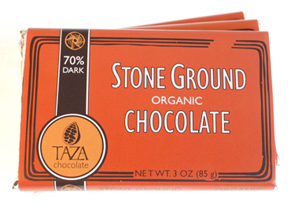Taza Chocolate
For my birthday this year, I received a chocolate bar. Not just any chocolate bar that you blindly rip off the wrapper and scarf down like Charlie searching for his golden ticket entry into Willy Wonka’s factory. Nope. This was a bar worth savoring. The flavor so distinct and pure it was only enhanced when I closed my eyes and made moaning noises.
It made me feel like I’d never really tasted chocolate…gone is the day when a Dove, Hershey’s, Cadbury or Ghirardelli will do. After all, if you’re going to indulge why not make it count and taste the most rich and phenomenal thing you can? Enter Taza Chocolate.
I recently had the privilege of an interview with Taza Chocolate partner Larry Slotnick. Here’s the Q & A.
danapop (dp) Your chocolate is pretty complex, how did you get interested in the art of chocolate?
Taza To be honest, I was interested in a chocolate company more from the food and farmer angle than anything else. It was my business partner, Alex Whitmore, who brought the passion for chocolatemaking to our endeavor. And complexity in food (and chocolate) – in our opinion – comes from using the simplest, most unprocessed ingredients you can find. Just think of whole grain bread compared to Wonder.
dp The history of chocolate is quite remarkable. To think of the Mayas and Aztecs eating and drinking chocolate and the religious and social significance of that culture, do you think in a sense you are returning to the original state chocolate is supposed to be? Meaning, less processed, more pure?
Taza We think we’re combining the best of both the Meso-American and European cultures when it comes to chocolatemaking. The Aztecs and Mayans only made drinkable chocolate that probably wouldn’t be recognized by anyone today. But parts of that culture have survived to this day in southern Mexico – Oaxaca, in particular – and that’s where Alex got his inspiration.
dp I know your partner Alex Whitmore has a huge role in the company as well, on a business note, do you think collaboration has taken Taza to another level? Do you think the company would’ve happened without this partnership?
Taza It couldn’t have happened without Alex, of course. The business, as alluded-to above, was his idea, and he asked me to join him in this endeavor. He is our chocolatemaker, and devised our unique, stone-ground process. Alex brought a great energy and creativity…as did I. His was geared toward chocolatemaking…while mine was geared toward building a brand and a cult-like following.
dp You’ve been involved with other very successful business ventures, how is the food industry, specifically the specialty foods industry different?
Taza In the food industry, you can start really small because there are small, independently owned food stores (in certain parts of the country) that will help you get started. Also, food is universally consumed, and chocolate is universally loved, so we made a good choice. Food’s right up there with shelter, clothing and, last but not least, transportation.
dp Who do you admire and wish to emulate in the industry?
Taza I think that Fred Schilling, founder of Dagoba Chocolate, really set the tone for acknowledging the farming communities that we all are dependent upon for cocoa beans…and trying to get them a fair price for their cocoa beans by helping them develop quality-oriented processes. He’s sold his company to Hershey, but he continues to put a lot of his boundless energy toward the cacoa bean farmers. The founders of Sharffen Berger (also now a Hershey company) set the stage even before Dagoba with bean-to-bar chocolatemaking in the mid nineties.
dp What do you think of the whole artisan chocolate craze? Do you think it’s a fad?
Taza No i don’t. Remember the microbrew “fad” in the 1980s that Miller, Anheuser-Busch and Coors didn’t take seriously?. Now there are hundreds of craft brews available in the US. In 10 years, there will be many more regional craft chocolatemakers dotting the landscape.
dp What is the best way to eat chocolate? Is there a specific pairing method to enhance the flavor?
Taza We look at chocolate as food. Though chocolate pairing is fun for special occasions, our favorite customers are folks who always have a Taza bar in their desk drawer or kitchen cupboard, and eat a few squares every day for that complex, mood-enhancing, and slightly sweet food experience.
dp Do you think the average consumer knows the difference between your chocolate and other chocolate – in the initial purchase? What sets you apart?
Taza We are all about our authentic, stone-ground production method. Our wrappers scream this at you pretty fervently. No one else does it.
dp Where do you believe the best chocolate in the world comes from?
Taza If you’re referring to cocoa beans, I would say Venezuela, Ecuador, Trinidad, Dominican Republic and Madagascar. The world’s best chocolate is produced in the United States. European makers are now playing catch up – as they are in beermaking.
dp Are there more antioxidants in your chocolate than say the average bar I can pick up at my local grocer?
Taza I like to think so because of our minimal processing – but we’ve never had it tested. Partner Alex Whitmore adds – We have actually had our chocolate tested for ORAC values (oxygen radical absorption capacity), which is the standard measure of antioxidant value. Our 80% dark bar has 418 uM Trolox eq/g. This is very high for a chocolate bar at 17,765 ORAC per serving (half bar).
dp What makes your chocolate different – the process behind it?
Taza We like to think it’s a variety of things…we’re a mission-driven company – DirectTrade, Stone Ground, and Organic. A lot of effort goes into being all those things, all the time. Our customers come to us and stay with us because of that. As for the chocolate itself, it’s got an intensity in flavor because of our light roasting and stone grinding and small-batch production that makes it different.
dp I keep reading about raw chocolate. What’s the deal?
Taza Chocolate can be called raw when none of the process temperatures rise above 120 degrees. Since we roast our cocoa beans at a higher temperature, and we maintain our cocoa mass at a higher temperature, Taza isn’t considered raw. With any raw food, raw chocolate is probably more nutritious.
dp What is the meaning behind the company name?
Taza Taza is a spanish word for “cup” – as in drinking cup. In our VERY early days, we were considering focusing exclusively on making, and serving, drinking chocolates at a chocolate lounge. The molinos – our stone grinders – are ideally suited for producing this type of chocolate.
dp Does your location say anything about your chocolate? Ie you’re producing these goods on the east coast in Somerville, Massachusetts, a relatively small town – sort of parallel with making small, high quality batches of chocolate. Does where you live influence you?
Taza It most certainly does, and I’ve stressed many times at company meetings that our location in Somerville has greatly contributed to our successful launch. Along with the abundance of gourmet and natural food stores in the area that were enthusiastic about what we were doing, we built our following by participating in farmers markets, community events and fundraisers from the beginning. In addition, we’ve been able to hire creative and hardworking staff who support our mission.
dp What is next?
Taza Taza will continue its effort to be at the forefront of changing people’s understanding about what chocolate is: where the ingredients come from and how it’s made. Too few people appreciate our dependence on farming communities. Our product line will evolve along the lines we’ve already started, as well in some new directions. What will not change are DirectTrade, Stone Ground and Organic.
dp Where can someone purchase your chocolate?
Taza Taza products are available all over the place. Our greatest penetration outside of New England is in places like San Francisco, Portland, OR and New York City. We’re building momentum across Canada, as well. Gourmet food stores and cheese shops, natural/organic stores, including food coops, cafes and wine shops, and, or course, our website.










